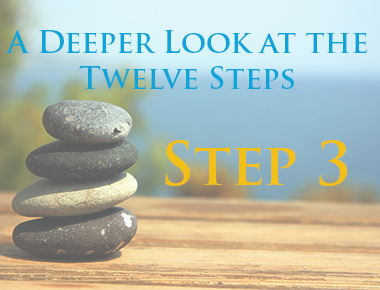
A DEEPER LOOK AT THE 12 STEPS: STEP 3
“Made a decision to turn our will and our lives over to the care of God as we understood Him.”
Step 3 of Alcoholics Anonymous’ twelve-Step program is based on a simple principle: Change your attitude toward life, and you can change your life.
The Purpose of Step 3

The purpose of Step 3 of AA is to eliminate the false beliefs behind substance abuse; namely, that we can control how much we drink and how we behave when under the influence of alcohol. In eliminating these beliefs, we change the way we think about drinking.
In this step, we must face the reality of alcohol addiction and seek help from whatever positive higher source inspires us most. We allow our higher source to care for us and guide us to a healthier life.
Step 3 also helps us prepare for the upcoming work of subsequent steps by initiating the self-reflection process that will be the focus of step 4, and the admission of our own wrongdoing to ourselves and to others that takes place in step 5.
A Question of Willpower

The third stage on the road to sobriety is one of the most important. It can also be one of the most frightening and difficult steps for recovering alcoholics to confront. That’s because it is the first step that asks us to take concrete action.
Step 1 demanded honesty. It forced us to recognize our powerlessness over our addiction. In step 2, we acknowledged a power greater than ourselves, whether that is A.A. itself, a vision of our ideal self, a counselor, or God. Both of these initial steps involved recognition and acceptance. Step 3 brings willpower back into the equation.
If that sounds confusing (after all, didn’t willpower cause the problem in the first place?), think of it this way: There is a difference between willpower and willfulness. We display willfulness when we demand our independence from everyone, when we naively believe we are in control of everything, and when we refuse even the sincerest offers of help. When A.A. speaks of willpower, on the other hand, it means the willingness to accept help from someone or something outside of ourselves, even if our whole mind and heart rebel against the idea.
More Than Empty Words

Simply put, Step 3 demands that we demonstrate our understanding of the previous steps by putting them into practice each and every day. This is where we transform a desire for reform into a decision to surrender. It’s one thing to admit our own helplessness and pay lip service to a higher power. Actually surrendering often takes a greater leap of faith.
To put it another way, it’s easy enough to search for affordable alcohol treatment centers and sign the papers on the dotted line. It’s more difficult to commit ourselves wholeheartedly to the recovery process. In order to surrender, we must let go of our grand plans, our inflated pride, and our exaggerated concept of self-control. We must relinquish negative feelings and let go of all those things we cannot hope to control.
Harnessing the Power of Surrender

In the end, if alcohol has taught us anything, it is that we have encountered a problem greater than ourselves. Only by harnessing a power that is equally great can we hope to free our minds and bodies from the vice-like grip of alcoholism.
When we put our foot on the third rung of the ladder, we commit ourselves to a lifelong struggle, a struggle that will demand enduring resolve and continual action. Thankfully, Step 3 also reminds us that failure is never final. No matter how many times we fall down, we can rediscover hope as long as we are willing to seek help.
How to Complete Step 3

Completing step 3 means being more comfortable with the concept of a higher power and accepting help. It requires placing trust not only in that higher power, but trusting the other sources through which that higher power works, such as a sponsor and support team. Repeating the Serenity Prayer can help in times of struggle when working through this step.
Step 3 can be full of twists and turns, of learning how to treat those who are there to support us with respect instead of suspicion. It is a step where we must take an honest look at addiction and see it for what it truly is.
Addiction Treatment for All

Enrolling in rehab for alcoholism means making a commitment to a brighter and healthier future, free from the chains of addiction. At Yellowstone Recovery, we understand that successful recovery requires commitment and time, and we believe that alcohol rehab should be available to anyone who needs it.
That’s why our non-profit treatment facility offers help for alcoholism at the most affordable costs in Southern California. Our clients receive a customized blend of holistic and individualized treatment options that benefit their personal growth, such as relapse prevention and group and individual counseling.
Our services include detox, IOPs and primary care and extend to outpatient and continuous support following treatment completion. This support includes placement assistance, where we connect clients with a peer group that helps them to find employment.
If you are a person who needs medical advice and help overcoming your battle with alcoholism or are the family member of someone who does, Yellowstone Recovery alcohol rehab in Orange County can help. Reach out to us today: (888) 418-4188.








